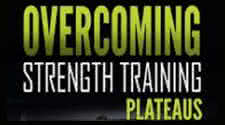Plateau in Strength Training - Fat Loss Peaks & Muscle Gain Plateaus

Don't Get Stuck with your Progress .. Diet is the Key
THOSE DREADED PLATEAUS
To most people the word plateau means a point at which weight loss seems to stop, but for those who are dedicated to perfecting their physiques, the word has other meanings too, such as a stalemate in gaining muscle or an inability to reach new poundage levels during training. Here's a step-by-step look at exactly what you must do to break any plateau you've reached, whether it's diet or training related.THE FAT-LOSS PLATEAU
You've been dieting for weeks to lose bodyfat but can't seem to shed the rest of those fat layers. Sound familiar? One problem might be that you've been in a calorie-deficient state for too long. Your body has adjusted to that caloric level and has stopped burning fat as a result. When denied enough food, the body begins to feed on protein in muscles. Because muscle is the body's most metabolically active tissue, depleting it lowers your metabolic rate. To break the plateau, you must make a number of changes:1. Move into a caloric-surplus state to recharge your metabolism. For several weeks gradually increase your calories - even to the point of gaining weight at the rate of a pound per week per 100 pounds of bodyweight.
2. Be sure to increase your calories with the proper foods - lean proteins, starchy carbohydrates and fibrous carbohydrates.
3. Without shorting yourself on calories, try dropping starchy carbohydrates (e.g. potatoes, rice, yams) from your last meal of the day. This modification will further stimulate your body's fat-burning capacity. One easy way to keep your calories up and stimulate your body to burn fat is to obtain your calories from supplementation with MCT oil.
4. Avoid conventional fats and simple sugars at all costs. Both are easily converted to bodyfat through various biochemical pathways.
THE MUSCLE-GAIN PLATEAU
Maybe you've been trying to pack on muscle by performing "killer" workouts - but getting nowhere fast. Believe me, I endorse killer workouts, but only if you're taking in enough quality nutrients and calories. If - proper nutrition isn't there to help you recover, those workouts won't do any good. Here's what to do:1. Get in the habit of making your nutrition as intense as your training. Increase your caloric intake for a few weeks to see if you can start gaining muscle again.
2. Design a supplement program for yourself that, along with proper food, will help your body's muscle-building machinery work more efficiently. These supplements include a maltodextrin-based carbohydrate formula, a special carbohydrate supplement that, when taken immediately after a workout, helps restore muscle glycogen for faster recovery; a protein powder to ensure that your body obtains enough muscle- building protein; MCT oil, a source of extra calories with the potential to naturally elevate growth in the body; and creatine monohydrate, a nutrient that increases certain energy compounds at the cellular level, thus allowing you to work your muscles even harder during workouts.
3. With high-calorie, nutrient-dense nutrition to undergird your muscle-gaining efforts, adjust your workouts. Lift heavier weights, change exercises or adopt a new routine.
4. Be sure you incorporate my technique of fascial stretching into your workouts. This stretching is done between exercise sets when muscles are fully pumped. Muscle size increases when fascial stretching is a regular part of your training program because it stretches the fascia, a protective sheath of connective tissue that envelopes the muscle. If a certain muscle still seems to beat a stalemate in size, strength or appearance, stretching it will help you overcome these frustrating plateaus.
THE TRAINING PLATEAU
If your problem is an inability to break through certain training poundages, you need to work on increasing your strength. Strength is the ability of a muscle to generate mechanical force and of the nerves to stimulate as many muscle fibers as possible. Proper training develops muscle fibers and trains the nerves running through them to discharge or "fire" at once. With maximal stimulation of as many muscle groups as possible you can build an excellent foundation of size and strength. There are several strategies to take.1. Follow my previous advice regarding diet, supplementation and stretching: Make sure you're fueling yourself with enough calories, performing fascial stretching, and taking creatine monohydrate. (This is an amazing nutrient for increasing strength.)
2. Follow the scientifically proven approach of a heavy-poundage, low- repetition routine using basic exercises such as squats, deadlifts, bench presses and overhead behind-the-neck presses. Significant gains have been achieved in a relatively short time (about six weeks) with 3 sets of 6 to 8 reps for each of these exercises.
3. Incorporate negative training into your workout to build greater strength. Negatives build a muscle in which more fibers fire at once. This training activates muscular growth by stimulating a greater number of muscle fibers during muscular contraction. With negative training you do only the lowering portion of the exercise. Take the bench press for example. Have your partner raise the bar for you. Then lower it while resisting the gravitational pull. In the training sequence employ negative repetitions after you have completed your heavy pyramid sets.
4. Use forced reps in your routine. A forced rep is the continuation of a repetition after you've reached failure on an exercise. It requires the assistance of a training partner who gently lifts the weight just past your sticking point. From there you take over, pushing the rep to completion.
No matter what your plateau, there are ways to smash it. To any of these methods add mental acuity - the commitment and concentration required to adhere to the right nutrition and training programs. You're not going to achieve your physique goals if you're splurging every other day on refined carbohydrates and processed foods - or if your mind wanders during your workout, and you quit halfway through. Stay focused, and you'll stay on track.